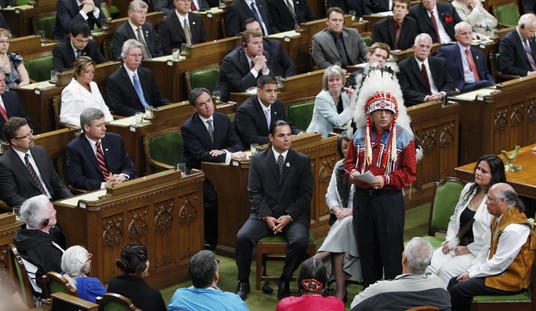One of Tennyson’s prettiest lines are uttered by a sorceress — Vivien — as she attempts to gain the confidence of Merlin and put him under a spell so that he might sleep forever in an enchanted wood, “lost to life and use and name and fame”. When he disbelieves her she lures him on with this song. Betrayal comes in the guise of an appeal to belief.
“In Love, if Love be Love, if Love be ours,
Faith and unfaith can ne’er be equal powers:
Unfaith in aught is want of faith in all.
“It is the little rift within the lute,
That by and by will make the music mute,
And ever widening slowly silence all.
“The little rift within the lover’s lute
Or little pitted speck in garnered fruit,
That rotting inward slowly moulders all.
“It is not worth the keeping: let it go:
But shall it? answer, darling, answer, no.
And trust me not at all or all in all.”
Faith, at least for those familiar with the story of Eden, is both the road to salvation and the path to perdition; and until recently regarded as a very potent quantity indeed. And maybe still. Caspar Melville of the New Humanist, intrigued by a recent spate of books which argue that atheism, not deism, is in decline, interviewed John Micklethwait, one of two authors of God is Back, to ask him why. Together with the other author, Adrian Wooldridge, another Oxford graduate also on the staff of the Economist, they explained that the answer must begin from the observation that, contrary to all 19th and 20th Western expectations, religion is booming, not declining; the question they have attempted to answer is why. Melville wrote:
But this “God book” is of a rather different order. Unlike its rivals it contains a wealth of fact and subtle argument, empirical evidence and expert witness. As we might expect from The Economist its perspective is global – it sweeps comfortably from the corridors of the Pentagon to a front room church in Shanghai, and speaks authoritatively about events in Nigeria, Pakistan and Egypt. Altogether it lays down a very serious challenge to any of us who had waved God a not-so-fond farewell.
But that was not the worst, Micklethwait went on to explain. There were empirical hints that faith was not only not incompatible with modernity, but part of it.
“Well, I’m not sure we are the first people to say it … the difference is that as reporters we have gone out into the world and seen the evidence. We have seen that religion is not going away, that it is in many ways a partner with modernity and not in conflict with it. Many people in Europe, ourselves included, missed the signs that religion was coming back. It took 9/11 for us to take notice, but as a phenomenon it started well before. Even as a Catholic I grew up in an environment which completely accepted the notion that modernity and religion are incompatible – we all thought that if religion did survive it would be a kind of subtle Anglicanism, some version of a doubting Graham Greeneish religion. The evidence shows we were wrong.”
“Take the CIA looking at the Shah of Iran, just before the revolution. Someone wrote a report saying that religion was an important factor in what might happen, and someone else scribbled a dismissive note on it that it was ‘mere sociology’. Or when Hezbollah first appeared in Lebanon and people were trying to fit them into the old left-right spectrum – I mean this was a group calling itself ‘the party of God’. When the Americans were preparing to invade Iraq it was clear that no one in the State Department knew anything about the differences between Shia and Sunni – they just didn’t think it mattered. In Europe there was this same pattern. Immigrants from all over the world moved to the UK and set up organisations like the Muslim Council of Britain, and the secular British state kept trying to reinterpret them as national or ethnic groups – they didn’t understand the significance of religious identity at all. History does not record the dwindling importance of religion. Instead it’s a story of people trying to push the issue aside – until September 11.”
There was also the compelling evidence of the emergence of new forms of Christianity in China and Nigeria, the growth of Islam across the Arab world and in Asia, and the proliferation of different strands of belief in the USA. And all of this was happening while modernisation proceeded apace.
As might be expected of writers at the Economist, Micklethwait and Wooldridge turned to business models to explain both the resurgence and shape of the new religious age. Because faith fills an established human need for the transcendent and a search for meaning, as people escaped from the menial drudgery and oppression of the past, it was only natural for them to turn a large part of their energies to religious-like activities. If Augustine’s opening to his Confessions “our hearts are restless until they rest in Thee, O Lord” is a true estimate of human nature, then from the market point of view, Voltaire’s observation that “if God did not exist, it would be necessary to invent Him” becomes a business opportunity. And one of the challenges that faced status quo all over the world was how to deal with it. The best model, Micklethwait, argued, was America’s, which created a dynamic marketplace of ideas and beliefs.
European secularists assume that the church is on the side of the ancien régime… but in America the evangelical movement advanced alongside democracy and liberal enlightened values. … in Eastern Europe religion has served as a battering ram for opening up the post-communist world because it serves as a focus for discontent. In Poland or Latin America even the Catholic Church has been a focus for dissent.
Melville confessed himself frankly shocked by these assertions and countered “this might well be true of America. But when, I asked, might we expect to see a free market of religions in Saudi Arabia?” To which Micklethwait argued that Islam was losing ground to Christianity when measured on a global basis simply because it lacked the ability to participate in “free market” of faiths.
Micklethwait happily conceded that Islam has a good deal further to travel but pointed out that it is losing significant ground to Christianity in the new markets of Asia and Latin America. “This is not what we expected given how well Islam did compared with Christianity in the 20th century in terms of expansion, and given that it was the arrival of Jihadi violence that alerted the world to the return of religion. Islam’s problems with plurality and individual conscience will drag it back. It has to go through a process – a Reformation or Renaissance or Enlightenment – which will be painful.
However that may be, the central subject of discussion — the decline of atheism in the world — which flashed like a meteor through the interview, is the unacknowledged elephant in the intellectual living room of Western academic and intellectual circles. The “of course God is dead” is only self-evident if it is evident. In my own view, man’s search for meaning, or his denial of it, are so deeply embedded in human nature that it seems fantastic in retrospect that sociologists would assume that populations, given a little public housing, a small welfare check and a tot of rum, would stop asking the ultimate questions. It seems far more likely that in the long run, they would return to the eternal questions with a vengeance. Whether or not one agrees with Micklethwait, the idea that atheism is the wave of the future must answer the empirical question of why God may now be a global growth industry.
The authors of God is Back understood that ideas and creeds could be both dangerous and beneficial. That even beneath the eaves of Broceliande freedom could not be wholly banished. And Vivien in deceiving Merlin, understood that faith could not wholly look out to the other; it had to turn in upon itself, at least if it were to betray. Love and faith were a bridge and not a road, and with these words beckoned Merlin to his sleep, yet from which one day he will return.
”My name, once mine, now thine, is closelier mine,
For fame, could fame be mine, that fame were thine,
And shame, could shame be thine, that shame were mine.
So trust me not at all or all in all.”
Men in the face of death.
Part 1: Prepare Yourselves
Part 2: “Lo, there do I see my Father!”










Join the conversation as a VIP Member